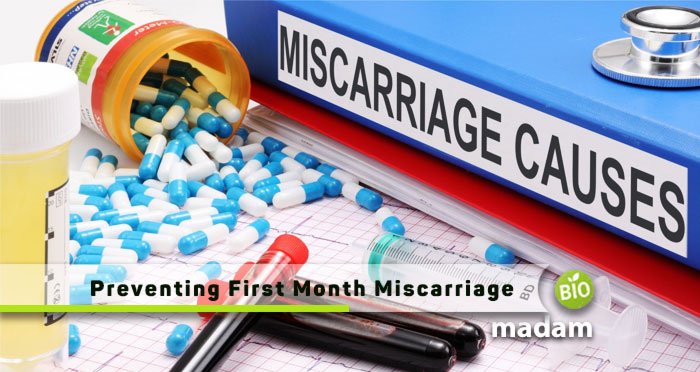The early stages of pregnancy are a special time, but it comes with its own set of concerns. Miscarriages, though quite common, can be emotionally challenging. Knowing how to prevent miscarriage in the first month is key to ensuring a healthy start to your pregnancy journey. This guide is here to offer practical tips, from preconception care to lifestyle adjustments.
We’ll explore the causes of miscarriage and provide insights into stress management. Our goal is to empower you with knowledge, helping you confidently navigate the delicate first month of pregnancy, and making informed choices for your well-being.
Causes of Miscarriage in the First Month of Pregnancy
Understanding the primary causes is crucial for effective prevention. Genetic abnormalities, particularly chromosomal issues in the fetus, stand out as a leading cause. Additionally, factors like maternal age, obesity, and underlying chronic conditions contribute to the risk, emphasizing the need for early intervention.
Lifestyle Modifications for Prevention
Preconception Care
Achieving and maintaining a healthy weight before conception is paramount for reducing the risk of miscarriage. It sets the foundation for a successful pregnancy. Additionally, emphasizing a balanced diet, rich in essential nutrients and incorporating at least 400 mcg of folic acid daily, promotes optimal fetal health and mitigates the risk of neural tube defects. Alongside nutrition, integrating regular exercise and physical activity into daily routines not only supports overall health but also prepares the body for the demands of a healthy pregnancy.
Healthy Habits during Early Pregnancy
During the early stages of pregnancy, cultivating healthy habits becomes crucial. Practicing good hand hygiene is essential, minimizing the risk of infections, a common contributor to miscarriage. Quitting smoking is a pivotal step in prevention, given its known association with increased risks of infertility, miscarriage, and other complications. Safe food handling further reduces the risk of foodborne illnesses, safeguarding both maternal and fetal health. Immunization with a flu shot enhances immune protection, providing an additional layer of defense against flu-related complications during pregnancy.
Stress Management for Pregnancy Health
Recognizing the impact of stress on pregnancy outcomes is vital. Research suggests that stress may elevate the risk of miscarriage, underscoring the importance of effective stress management. Identifying major stressors, such as divorce, abuse, or grief, allows individuals to seek timely intervention and support. Consulting healthcare providers for stress assessment and accessing resources like therapy or medication becomes integral in maintaining overall well-being during pregnancy.

Weight Management
Addressing the impact of weight on miscarriage risk is essential. Discussions around obesity and being underweight highlight the importance of achieving a healthy weight for a successful and healthy pregnancy. Stressing the significance of maintaining a healthy weight before conception becomes a proactive measure, contributing to optimal maternal and fetal outcomes.
Dietary Guidelines
Emphasizing a nutritious diet rich in fruits, vegetables, and whole grains is pivotal in reducing pregnancy complications. This dietary approach not only supports maternal health but also positively influences fetal development, laying the groundwork for a healthy pregnancy.
Prenatal Care
Encouraging the early initiation of prenatal care is fundamental. This practice allows for the identification and timely management of potential issues, ensuring that both maternal and fetal health are closely monitored. Regular check-ups during pregnancy provide ongoing support and guidance, contributing to a healthy and well-monitored pregnancy journey.
Managing Chronic Health Conditions
Highlighting the importance of adequately controlling chronic conditions like diabetes, hypertension, and thyroid disorders is critical for a healthy pregnancy. Effective medication management under medical supervision becomes essential to ensure the well-being of both the mother and the developing fetus.
Safe Sex Practices
Raising awareness about sexually transmitted infections (STIs) and their impact on pregnancy outcomes is crucial. Recognizing the importance of screening for STIs before conception contributes to a healthier pregnancy. Promoting condom use, even during pregnancy, becomes an additional measure to reduce the risk of STIs and potential complications.
Alcohol Abstinence
Advising zero alcohol consumption during pregnancy is a key preventive measure to avoid fetal alcohol syndrome and reduce the risk of miscarriage. Complete abstinence from alcohol is encouraged as a proactive approach for a healthy pregnancy, ensuring the well-being of both the mother and the developing fetus.
Signs of Miscarriage in the First Month of Pregnancy
Recognizing potential signs and symptoms of first-month miscarriage is vital for early intervention. While symptoms can vary, common indicators may include:
- Vaginal Bleeding: Light to heavy bleeding, sometimes accompanied by clotting.
- Cramping: Abdominal pain or discomfort, often similar to menstrual cramps.
- Disappearance of Pregnancy Symptoms: Sudden reduction or loss of typical pregnancy signs like breast tenderness and nausea.
- Pelvic Pain: Persistent or acute pain in the pelvic region.
- Tissue Passage: Passing of tissue or clots from the vagina.
Being vigilant about these signs allows individuals to promptly seek medical attention, improving the chances of a positive pregnancy outcome.

Do you Bleed when you have a Miscarriage in the First Month?
Miscarriage in the first month may look like continuous bleeding. Sometimes, bleeding turns out to be a potential indicator of miscarriage, but not all instances result in pregnancy loss. Key points to consider include:
- Consistency: The nature of the bleeding, whether light spotting or heavy flow.
- Duration: How long the bleeding persists.
- Associated Symptoms: Presence of pain, cramping, or the passage of tissue.
How Often do you Miscarry in the First Month?
Let’s talk numbers. Research shows that a considerable chunk of pregnancies face a miscarriage within the initial month. Stats indicate this is a common occurrence, emphasizing the importance of being in the know and taking proactive steps in preconception care. The data suggests that being aware and adopting preventive measures early on can significantly contribute to a healthier pregnancy. So, by understanding these stats, you can make informed choices and prioritize your reproductive well-being.
Conclusion
A proactive approach to preventing miscarriage in the first month involves a combination of lifestyle modifications, early prenatal care, and awareness of potential signs. While not all miscarriages can be prevented, adopting these measures significantly enhances the likelihood of a healthy pregnancy. Individuals must consult healthcare professionals for personalized advice and support throughout this journey.

People call me Domonique Smith in Ross! I was always fond of helping people, so opted an MBBS degree to pursue my passion as my career. My major interests fall in dealing with pregnant ladies and helping them in the best of my wills for their comfort. I am further planning to choose Gynecology as my major, so wish me luck!

